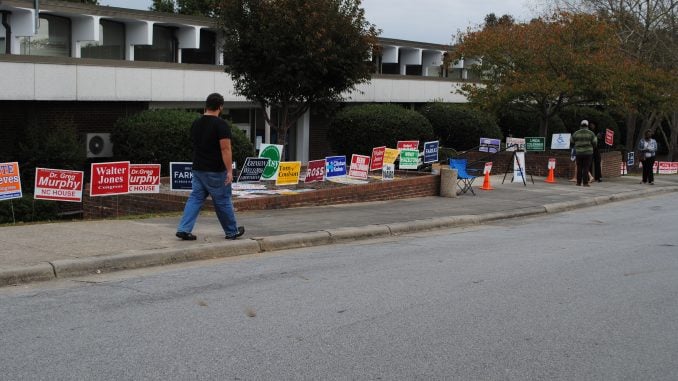
Raleigh – This week N.C.’s political parties are charting their courses to November after the candidate filing period ended February 28. The flurry of activity was closely watched as candidates assessed races, raised money and eyed their competition. For the first time nearly all 170 races in N.C. have a Democrat and a Republican running, and often a libertarian. The exception is House District 24, where conservative Kenneth J. Fontenot, a Marine veteran and middle school teacher, filed as an unaffiliated candidate and the state Republican party plans an endorsement once he gets on the ballot by rounding up 2,000 signatures.
This variety of candidates is a dramatic shift from past election years. In 2016, 70 of the 170 races had only one party represented on the ballot by election day. The NCGOP attributes it to increased interest in running, but also coordinated recruiting by the parties.
“I’m impressed with our diversity, our youth, and our energy,” said Dallas Woodhouse, executive director of the NCGOP.
“The people are out there, but you’ve got to go find them,” he said. “Both sides should be praised for doing a good job, and they should be castigated for not having done more in the past. One of the lessons that we had to learn, is that the party is growing, we are growing in registration, we’ve got a growing interest in the party… There are probably a million or 750,000 extremely loyal Republican voters, who vote in virtually every Republican primary, and we know very few of them.”
“This idea that somehow when Republicans started drawing districts, people didn’t want to run for office anymore, that has been completely debunked.” Dallas Woodhouse, N.C. Republican Party
A host of new candidates filed this year; women, students, newcomers and some familiar faces. Former N.C. Senator Robert Rucho has filed to run again from Iredell County, and retired Judge Toby Fitch, of Wilson, a Democrat, is running for the NC Senate District 4 seat. In Boone, Republican Robert Block, a junior at Appalachian State University, is challenging four-term Republican incumbent Jonathan Jordan for House District 93.
The N.C. Democratic Party says their #120DistrictStrategy campaign has yielded positive results with all 120 district races offering a Democrat on the ballot. They are aiming to break the Republican veto-proof majority in the N.C. General Assembly by picking up at least four seats in the House, helping Democrat Governor Roy Cooper get more of his policy through the legislature. In 2016, Democrats had the same goal but came up empty, losing a seat in the Senate.
“This is a historic day,” Democratic Party Chairman Wayne Goodwin said after the filing deadline. “Democrats entered this midterm with one goal: Recruit a candidate in every single district to break the Republican supermajority this fall.”
Goodwin held a “listening tour” during the filing period and used social media to highlight the “resistance” and anti-Trump energy surging through the party. But among the challenges facing Democrats are a surging state and U.S. economy coupled with job growth, because when the economy is strong, voters tend to keep incumbents in power. Plus, polling shows voter support for issues like school choice, something the party has rejected. Congressional Democrats G.K. Butterfield, David Price and Alma Adams are all going to return to voters and explain why they didn’t vote for the historic tax cut bill and why there is no fix for DACA. However, NCDP announced in January that they have $2.4 million in cash on hand heading into campaign season, a record for the state party.
“This is the best position our party has ever been in heading into a midterm election. We are humbled and grateful to have the support of so many North Carolinians ready for change,” said Goodwin.
Republicans, on the other hand, are fighting controversial Twitter storms from the White House, a failed effort to reform healthcare and immigration, and repeated state headlines about the acrimonious relationship between the Republican-led General Assembly and Cooper, brought into sharp focus by a litany of courtroom battles. But they also have three of state budget surpluses, annual teacher raises, dropping unemployment, and national recognition for the state’s economic performance since taking the majority in 2011.
“There is nothing to indicate some big blue wave. The more democratic-friendly districts that they got the court to give them, unjustifiably in my opinion, will certainly result in a few democratic pickups,” said Woodhouse. “Our goal is to retain governing majority, whether that’s the supermajority or pretty close, it’s the majority that means we can in fact continue to implement our policies… and I believe we will be able to do that.”
Yet to be determined is whether Democrat Rep. Duane Hall (D-Wake) will resign after two N.C. Policy Watch stories reported that five staffers are accusing him of sexual harassment. Party chairman Goodwin, Governor Copper and others have called on him to step down but he has refused, reportedly calling the stories a “vendetta” by Policy Watch and some of its employees with whom he’s had relationships. However, other outlets were also tracking the story, some for more than a year. The stories were published just hours before the filing period closed. Hall will have a primary before he would face either Republican Tyler Brooks or Republican Shawn Hamilton, and Libertarian Travis Groo.
Now that the candidates have filed, the parties’ attention turns to May 8, when more races than in past election years will have party primaries.
“Voters are certainly going to have more access than ever before and we think that’s a good thing,” said Woodhouse.
The winners of those primaries will face off on Tuesday November 6, 2018 in the midterm elections.


